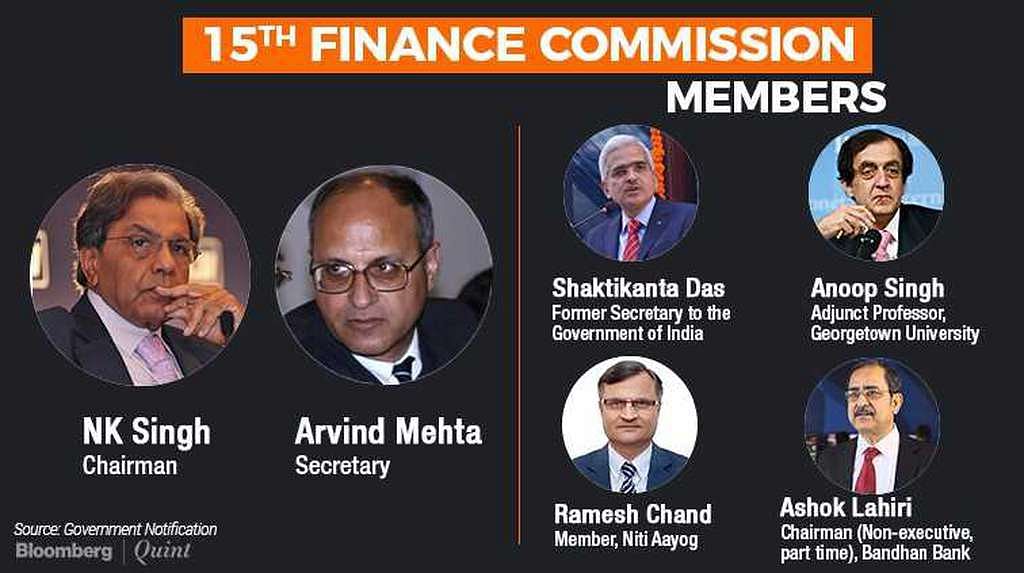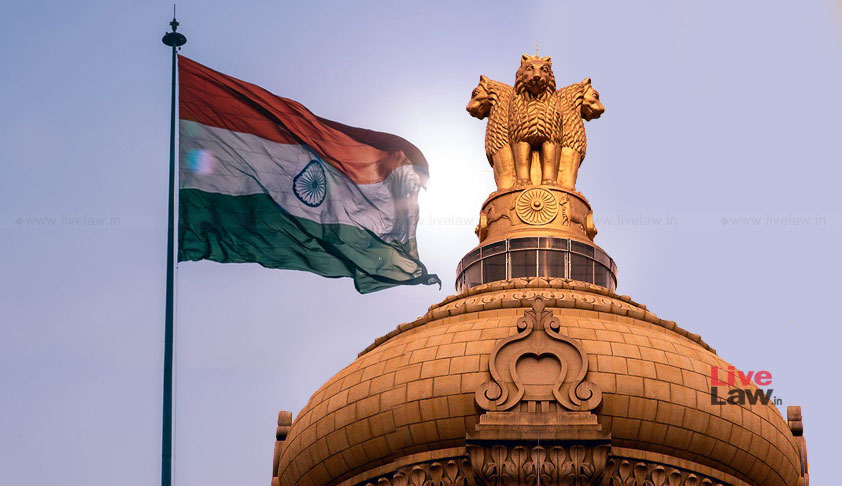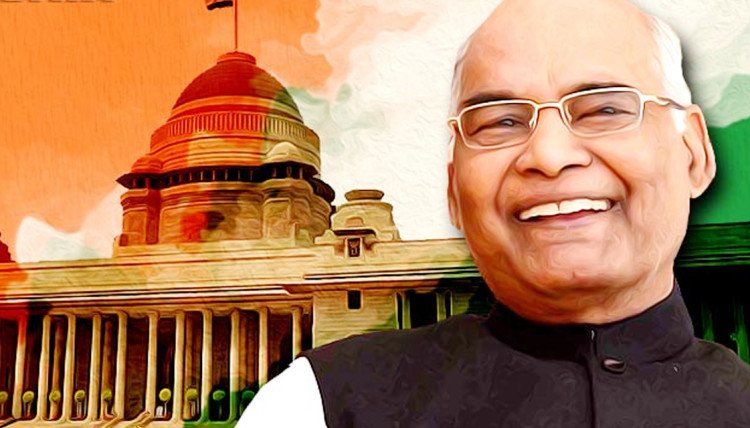The 15th Finance Commission (FFC) on 9th November (Monday) submitted its report — which defines the devolution of Central tax revenues to states and other fiscal matters — for the five-year period from 2021-22 to 2025-26 to President Ram Nath Kovind.
Titled ‘Finance Commission in Covid Times’, the report was submitted by the Commission Chairman NK Singh along with Members Ajay Narayan Jha, Ashok Lahiri and Ramesh Chand and Prof. Anoop Singh.
The report pursues to discourse a whole series of issues counting transfer of funds to local bodies, disaster management grant and performance incentives to states, issues of defence expenditure.
It will be made public domain once it is tabled in the Parliament by the Centre along with explanatory memorandum/action taken report on the recommendations contained in the report. (Source: The Indian express)

India’s federal structure of Governance allows the centre to collect Most of the important taxes. But a lot of Expenditure falls in the states which Means they also need to be helped with a Commensurate portion of tax revenue.
So What portion of Taxes should the Centre share with the states? This is Exactly the question that the Finance Commission decides every five years. In this line of finance Commission’s, the 15th panel constituted in November 2017 became the first to use the 2011 Population census to decide the tax Sharing.
The Finance Commission responsibility is to decide as to how these taxes should be shared between the centre and the states while working out a tax sharing formula. The Finance Commission considers the revenue performance of the state’s population as well as income. Distance other factors like the needs of the state’s poverty and special circumstances are also considered.
You see Finance Commission asked for a constitution article 280 of the Constitution provides for setting up of Finance Commission every five years. If you look at the federal structure of financing, you will find that the Government of India has more resources by way of Taxation. And the state governments do not have that much of resources.
Arrangement has been set up by which resources from the Government of India will be devolved to the skates on a formula basis and this formula is decided by the Finance Commission. Till the 14th Finance Commission population data of the 1971 census was used to determine the terms of reference.
The 15th Finance Commission is using the 2011 census figures that is being opposed by many states especially those that work towards population control. Between 1971 to 2011 these states allege that the new parameters will end up punishing instead of rewarding them.
Apart from the Finance Commission there are many other ways to help the state’s financially. The founders of a constitution made several provisions in the Constitution for this. Let’s find out what they are.
Our Constitution makers conceived a country where everyone has equal rights on all the resources be they natural or material resources emphasis is on the equal distribution of financial resources between the states and the centre. The Finance Commission plays a very important role in ensuring the Constitution makers were clear that never will the centre think that any state is at its mercy.
:max_bytes(150000):strip_icc()/GettyImages-1148457833-2fa5ab95fce04bbc956515d5a1c9782f.jpg)
While at the same time states will never feel the centre is exploiting them. There is also no separate constitutional provision that lays down the state’s liability for revenue contribution to the centre. That task of distribution was left to the finance commission but the law related to taxes was clearly mentioned in the constitution. Article 268 to 281 clearly mentions the division of revenues between the center and states.
It is true that we needed a certain degree of fiscal centralization in the early decades after independence. Because we inherited 550 principalities of rajas and maharaja’s in 1947 from the British. And we needed to create a modern nation-state. Therefore, there was a need for a strong central government. Therefore, it was necessary to have a certain degree of fiscal centralization as well.
However, over time obviously our modern nation-state has evolved and states need more space and therefore fiscal decentralization must happen. The founding fathers of our constitution were aware that even after the revenue distribution the center will have miscellaneous sources of money while states will have less money.
According to article 275 one of the Constitution Parliament through a law can give grants to the States when required. ‘how much’ will be decided by the Finance Commission. Apart from this under article 282 both the center and the state can give grants for any public purpose. But it has been excluded from the finance Commission’s decision making.
There should be some objectivity in transfer of resources to the States which should not be at the whims and fancies of the government that is in power on the particular day. It also ensures that the states will be in a position to exactly know what is the quantum and the likely resources they would receive every year.
So that will be useful for them in their budgetary preparations as well as for great framing various schemes of expenditure for the states. So in a sense it provides that no motor certainty to the resources that the states would get from the center. That’s a major purpose for the finance commission.
Apart from the grants, center and the state can take loans from the consolidated front of India under article 292 of the Constitution the center can take notes from both internal and external sources. Under article 293 states also have the right to take loan but not from external sources. Apart from this the Constitution also has a provision for financial review for local administrations.

Information about the functioning of the state-level commissions has been given in article 243 and why’s of the state level Finance Commission has been given pass to review the financial status of the local administrations with a 73rd and 74th articles of the Constitution it becomes more important.
In this way important provisions have been made in the Constitution for the revenue system from center to village panchayats. So the most decentralized government’s most fiscally decentralized governments are the rich country governments and we need to move in that direction.
For the division of taxes between the center and States from time to time important changes have been made in many articles by amending the Constitution. The Constitution 80th Amendment Act 2000 based on the recommendations of the 10th Finance Commission through a constitution amendment deals with an alternative scheme for sharing taxes between the Union and the states.
Apart from this the 101st Constitution amendment bill has changed the system of indirect taxes for goods and services tax Bureau report. Ever since the first Finance Commission was set up the nature of India’s economy as well as macroeconomic policy has changed dramatically. In this report let’s take a look at the structure of the previous Commission’s as well as their recommendations that they have made in several years.
We tell you that the first Commission was set up in 1951 by the then president under Article 280 of the Constitution. The president is entitled to appoint this Commission. Taking a look at the report the Finance Commission is a constitutional independent non-political body there have been 15 Finance Commission till date. The most recent was constituted in 2017 and is shared by NTSC a former member of the Planning Commission.
If all the revenues are collected by the centre and the expenditure is undertaken by the state, then how is the centre of the state going to actually spend anything if it doesn’t collect much taxes itself. Not that it doesn’t collect taxes of course it collects taxes.
That’s the own tax revenue and every state must collect more and more own tax revenue and be more self-reliant rather than be simply dependent upon the devolution of taxes which are collected by the centre.
But clearly given the imbalance in our federal judicial structure of who spends and who collects the finance Commission’s role is absolutely central. The Finance Commission of India came into existence on the 22nd of November 1951 and remained operational from 1952 to 1957. The second Finance Commission was constituted by President Rajendra Prasad on the 1st of June 1956 for the period 1957 to 1963.
It recommended that the share of the states in the net proceeds of income tax should be increased to 60%. It also said that the actual distribution of share assigned to the state should be on the basis of population.
The third finance commission was set up in December 1964. One of its main recommendations was to formulate an independent commission to assess the tax potential of each state to review its tax structure and also recommend rates under different heads of levies of the state list.
The fourth Finance Commission was constituted by the president in 1964. It recommended tax sharing and allocation of income tax and Union excise duties as well as grants in aid to states in need of assistance.
Finance Commission was appointed in February 1968 for the period 1969 to 1974. On the 28th of June 1972 the sixth finance Commission was appointed and ready it remained operational from 1974 to 1979.
The seventh finance Commission was appointed in 1977, it recommended that the share of states in the net proceeds be raised to 85% except the share of the union. The eighth finance Commission came into being in 1982 operational from 1984 to 1989.
The Commission made recommendations relating to sharing of income tax union excise duties and grants-in-aid it suggested retention of the share of the states in the proceeds of the income tax at 85 percent level.
The ninth finance Commission was constituted in June 1987 from 1989 to 1995. This commission also made recommendations on income tax relief funds as well as debt relief. The 10th finance Commission was incorporated in 1995.
The Commission took note of the growing revenue expenditure and deficit on revenue account as well as grown entire regional disparities in the country’s finance both at center and state level.
The 11th Finance Commission was appointed on the 3rd of July 1998 for the period 2000 to 2005 that recommended the share of states in the net proceeds of all central taxes and duties be fixed at 28 percent. It also said 1.5 percent of all tax revenue should be allocated to the state separately.
The 12th Finance Commission of India was appointed on the 1st of November 2002 was operational from 2005 to 2010. Major recommendations were to bring about macroeconomic stability. It also suggested that the total fiscal deficit for centre and states be reduced to 3 percent of the GDP and the total tax GDP ratio of both center and state be increased to 17.6 percent of GDP in 2009 and 10.
It also made recommendations on distribution of Union tax grants to local bodies grants in aid to States and calamity relief. The 13th Finance Commission was constituted on the 13th of November 2007. The duration of this commission was from 2010 to 2015.
The 14th Finance Commission was set up on 2nd January 2013. Its major recommendations are that the share of seats and net proceeds of the shareable central taxes should be 42 percent. Besides it also suggests reduction and elimination of revenue deficit.
The 15th Finance Commission was set up in November 2017 for the period 2020.
Experts say the task of the 15 Finance Commission has been made tougher after the rollout of the goods and service tax regime. After the GST roll out certain taxation powers have been taken away from the Union and the states and given to the newly formed GST Council Bureau report.

